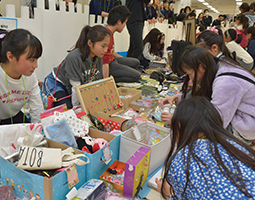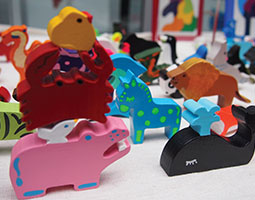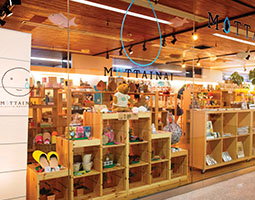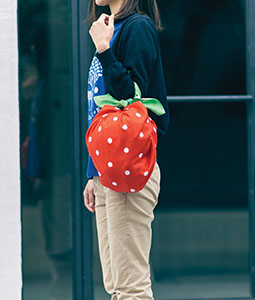Home > Highlighting JAPAN > Highlighting Japan July 2018 > From Japan to the world
Highlighting JAPAN
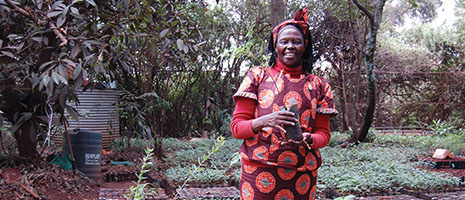
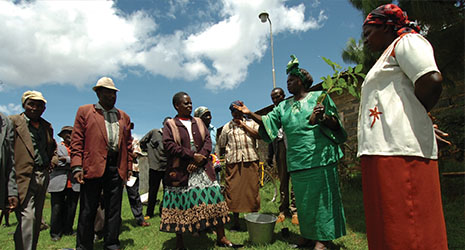
MOTTAINAI : Reduce, Reuse, Recycle—and Respect
The MOTTAINAI Campaign is a movement in Japan with an interesting genesis that takes its name from the Japanese word mottainai, which is often translated as “What a waste!” The meaning, however, goes much deeper, and the concept is far older.
“THE word mottainai comes from a Buddhist term mottai, which means ‘undue importance,’ along with the word nai, which denotes negation,” says Tatsuo Nanai, the MOTTAINAI Campaign’s chief of secretariat. “Thus, mottainai means ‘without importance.’ For example, to leave behind a grain of rice when eating is to waste it, to render it meaningless.” Nanai notes that the term has apparently been around for nearly eight hundred years, and there are various opinions on the origins and interpretation of it.
“When Kenyan activist Wangari Maathai* was in Japan, she asked if there was such a concept as ‘reduce, reuse, recycle’ in Japan, and we told her about the concept and culture of mottainai,” says Fumiko Anbo, a MOTTAINAI Campaign secretariat. “She was really interested in that. The 3R concept is a very Japanese concept, but the idea of mottainai also includes the nuance of a fourth R—that of respect.”
After Maathai’s visit, The Mainichi Newspapers launched the MOTTAINAI Campaign to encourage environmentalism and reduce waste in 2005. The paper partnered with Itochu Corporation, and in collaboration with Maathai they worked to spread the mottainai concept both within Japan and internationally. For example, in 2005 Maathai spoke about the campaign at the United Nations in New York.
The campaign has four main pillars. The first is a tree-planting effort in Kenya called MOTTAINAI Green Project, where proceeds from events in Japan are used to aid in the reforestation of Maathai’s home country.
Secondly, the campaign works to spread the idea of mottainai through its website and other media efforts. The campaign also hosts various events to promote the concept, such as flea markets and handmade craft fairs. And finally, they have launched a web shop selling products that adhere to the 4Rs: reduce, reuse, recycle and respect. For example, they sell furoshiki (traditional Japanese wrapping cloths) made from fabric created from recycled plastic bottles. They are reusable and meant to reduce packaging waste, while the cute and beautiful designs encourage careful and enthusiastic use.
Maathai understood that the idea of mottainai not only connects to reducing, reusing and recycling, but also respecting the things we eat and the things we use—the things that are part of our everyday lives. Things should be used with reverence for their worth to us, repaired and treated with care. It’s not unusual in Japan to say otsukaresama—meaning “thank you for your hard work”—to an item when it can no longer be used. A great example is Hari Kuyo (literally “a mass for needles”), an annual festival where people solemnly “retire” their old and broken needles, placing them in a block of soft tofu or konnyaku (jellied devil’s tongue root).
Nanai and Anbo hope that the mottainai concept will continue to spread. On the topic of plastic and packaging, for example, they acknowledge that a cultural shift needs to happen in Japan to convince people to waste less. However, there have been changes in the last decade. More people are refusing disposable bags and cups in favor of reusable ones. And the campaign is targeting the younger generation with events like kids-only flea markets to expose children to the idea early. Some textbook producers have even asked to include passages about mottainai in their pages.
Around the world, the concept is also taking off. In Indonesia there is a “mottainai dance,” and in Vietnam they have held a mottainai festival. The best thing about these events is that they were not organized by the MOTTAINAI Campaign, but rather were picked up and created by local communities themselves.
The concept of mottainai is an ancient one in Japan, but its resurgence in Japan and the world owes a great debt to Wangari Maathai. Although Maathai passed away in 2011, her work lives on through the MOTTAINAI Campaign and her resonant message of respect, gratitude and reducing waste.
* Kenyan activist Wangari Maathai worked for nearly forty years on a range of social issues, and in 2004 was awarded the Nobel Peace Prize for her work on sustainable development, democracy and peace in her native Kenya and beyond.
© 2009 Cabinet Office, Government of Japan
